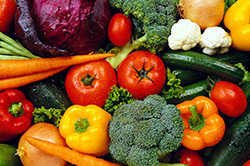Healthy eating is just common sense, especially where cancer is concerned. Thankfully, there are proven cancer prevention recommendations for foods and drinks that can help lower the chances of cancer affecting you. By incorporating them into your daily life, you’ll not only feel healthier, but you will be less at risk of some cancers.

Eat more fruit and vegetables
Fruit and Vegetables contain natural substances that can destroy cancer-causing agents (carcinogens). Eating plenty of fruit and vegetables can significantly reduce the risk of developing digestive tract cancers (including the mouth, pharynx, oesophagus, stomach and bowel).
Reduce alcohol consumption
High levels of alcohol consumption can increase our risk of cancer. Limit your consumption to standards recommended by health physicians.
Avoid foods high in salt
![~EWG~J)WBO$A1(R$S]_D9(E](https://www.cancer-fund.org/wp-content/uploads/2016/08/EWGJWBOA1RS_D9E.png)
Diets high in salt have been linked to an increase in stomach cancer, and can also lead to high blood pressure.
75% of our salt intake now comes from packaged and take-away foods.
Tips for eating less salt:
- Reduce the salt you use gradually – this will help you get used to the flavour
- Look for low-salt and no added salt or salt-reduced products
- Use creative cooking methods to add flavour to meals, use garlic, onion, chilli, lemon juice, vinegar, pepper, herbs, curry paste, spices or flavoured oil such as sesame, mustard seed or extra virgin olive oil.
Eat low-fat foods
We often associate ‘fats’ with weight gain and unhealthy eating habits and are told that eating fatty foods could lead to obesity, diabetes, heart disease and cancer.
However, certain fats are essential to our health and provide the following benefits in terms of cancer prevention:
-
Supplies essential fatty acids (linoleic and linolenic acid) that our body cannot produce. These fatty acids are essential for brain and eye development in children and also maintain good skin health for adults.
-
Enhances absorption of fat-soluble vitamins (e.g. vitamin A, D, E and K).
-
Supplies energy
-
Provides protection for internal organs
-
Insulates the body for warmth
-
Satisfies hunger when a moderate amount of fats are included in a meal
It is widely known that one should limit saturated fats and cholesterol intake minimises the chances of high blood cholesterol and is a powerful tool for cancer prevention. High cholesterol and saturated fat foods include fatty meats, offal, skin, full-fat dairy products, butter, coconut and palm oils and fried foods. Conversely, unsaturated fats are actually good for our hearts by lowering bad cholesterol (low-density lipoprotein - LDL) and triglycerides, and also increasing good cholesterol (high-density lipoprotein - HDL).
Two Major Types of Unsaturated Fats Include:
- Polyunsaturated fats - lowers LDL and triglyceride levels
-
Oil: corn, sunflower and soybean oil
-
Fatty fish: mackerel, salmon, sardine, swordfish
-
Soy products: tofu, soy milk, bean curd
- Monounsaturated fats - lowers LDL and raises HDL levels
-
Oil: canola and olive oil
-
Seeds & nuts: almond, hazelnut nut, sesame & pumpkin seeds
-
Avocado, olive
Tips to Increase Your Good Fats
- Use vegetable oil, especially canola and olive oil when cooking.
- Eat fish at least 2 times per week, preferably fatty fish.
- Eat 30grams (1 ounce) of unsalted nuts and seeds every day.
- Have soy products at least once to twice weekly.
Click here to download our cancer information booklet on diet and cancer.

Helpline
Tel: (852) 3656 0800
Donation Hotline
General donation:(852) 3667 6333
COF Monthly donation:(852) 3667 6332 
- Questions or comments: please use our comments page
- Donation enquiries: [email protected]
- Media enquiries: [email protected]
- Fundraising enquiries: see Get Involved



